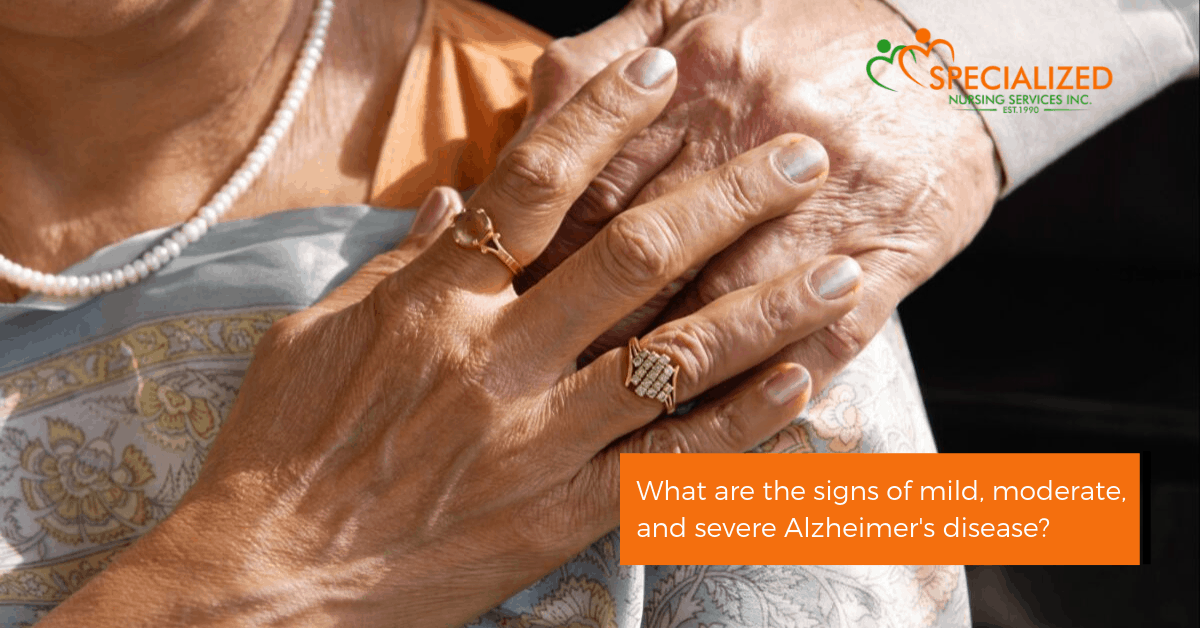What are the signs of mild moderate and severe Alzheimer’s disease?
It can be hard to tell if our loved ones may be experiencing symptoms of Alzheimers. It can also be hard to face the issue. Alzheimer’s disease can be challenging. There is hope, that the earlier and more effectively you diagnose the disease the more likely that treatment will be effective.
In this blog we’ll explore signs of mild, moderate, and severe Alzheimer’s disease. You can use this information to gather data and see if there are indications of Alzheimer’s disease. If so, make an appointment with a physician immediately.
Even though Alzheimer’s disease can be challenging, there is hope when it is properly diagnosed. Look for these indications of Alzheimer’s disease and get it treated and taken care of early. We’re here to help you throughout the process.
Mild
Those individuals who are experiencing mild Alzheimer’s disease will begin to exhibit various cognitive and physical symptoms. Alzheimer’s disease onset affects the brain’s cognition. The brain begins to function differently and certain faculties of the mind are hindered. Alzheimer’s cognitive impacts primarily affect memory and personality and mood.
Early stages of Alzheimer’s disease symptoms related to memory can be expressed as memory loss, repetitive questions, and getting lost or losing things. This also encompasses poor judgement and ultimately bad decision making for those experiencing symptoms of dementia and Alzheimer’s disease. Sometimes, those experiencing early onset symptoms of Alzheimer’s disease take longer to complete tasks and have trouble with basic math or bill pay.
Mild Alzheimer’s disease symptoms related to personality and mood express in various ways. Most patients experiencing dementia begin to have mood swings or abnormal behavior for their baseline personality. Some patients experience loss of spontaneity or the sense of motivation and initiative. Other patients have an increase in anxiety or aggression.
It is important to take note of these symptoms of mild Alzheimer’s disease early because this is when it is most often and successfully diagnosed.
Moderate
As Alzheimer’s disease is a degenerative one, the symptoms only become more severe. Each patient should be assessed on an individual basis compared with their own baseline behavior. More intense symptoms may indicate a more aggressive form of the disease.
Moderate Alzheimer’s disease expresses itself cognitively, with mood and personality, and also with motor skills.
Moderate Alzheimer’s disease has a similar impact on memory and functioning of the brain as mild Alzheimer’s but more severe. An increased loss of memory and a sense of confusion are characteristics of this stage of dementia. At this stage of dementia, it can be difficult even to recognize family and friends.There is an inability to learn new things, and language capacities like reading and writing become challenging. Those with moderate Alzheimer’s have difficulty thinking logically, rationally or presenting ideas in a well organized way.
Those with moderate Alzheimer’s symptoms may experience mood and personality changes including those mentioned above as well as increased anxiety coping in new or unfamiliar situations. Moderate Alzheimer’s disease also limits attention span or ability to focus. In some cases, patients may experience paranoia or delusions. Someone diagnosed with moderate Alzheimer’s disease may also exhibit changes in personality like sadness, use of inappropriate language or impulsive behavior, and sudden episodes of anger.
Moderate Alzheimer’s disease also expresses itself as degenerative to motor skills. You may see someone with Alzheimer’s disease express physical restlessness or agitation. Sometimes this degenerative disease also creates muscle spasms and twitches, or repetitive movements or speech.
If your loved one is exhibiting the above symptoms, have them screened for Alzheimer’s disease and begin to take preventative measures. Specialized Nursing Services is happy to provide care and support you and your loved one to keep them safe.
Severe
Those suffering from a severe case of Alzheimer’s disease will exhibit symptoms from the extreme end of the spectrum This level of dementia is degenerative and affects cognition, mood and personality, motor skills and the physical body.
In addition to the above symptoms, severe Alzheimer’s disease limits cognition immensely. Memory loss and confusion are constant, and there may be a complete inability to communicate.
The personality and mood of those in a severe stage of Alzheimer’s disease is typically withdrawn and lacks recognition of self or others. There may also be increased delusion or paranoia.
Severe Alzheimer’s disease is characterized by loss of fine motor skills and gross motor skills. Many suffering from severe dementia also lose the capacity to walk or to control bowel and bladder movements. Some individuals may also experience seizures.
The physical body of someone with severe Alzheimer’s disease will be thin or emaciated. The patient may have skin infections and difficulty eating or swallowing. They may also experience an increased need for sleep.
Alzheimer’s disease should be diagnosed and treated at its earliest stages, and even during onset if possible to avoid undue suffering.
Do you recognize any of these behaviors or signs in your loved one? It is important to be mindful of the signs so you are informed and prepared on how to recognize Alzheimer’s disease.
Alzheimers is not an easy illness to face, but with the tools to identify it, those suffering from Alzheimer’s can find some relief. We’ll be happy to help with patient care plans and at home nursing for your loved one. Call us today.
[gravityform id=”1″ title=”false” description=”false”]


